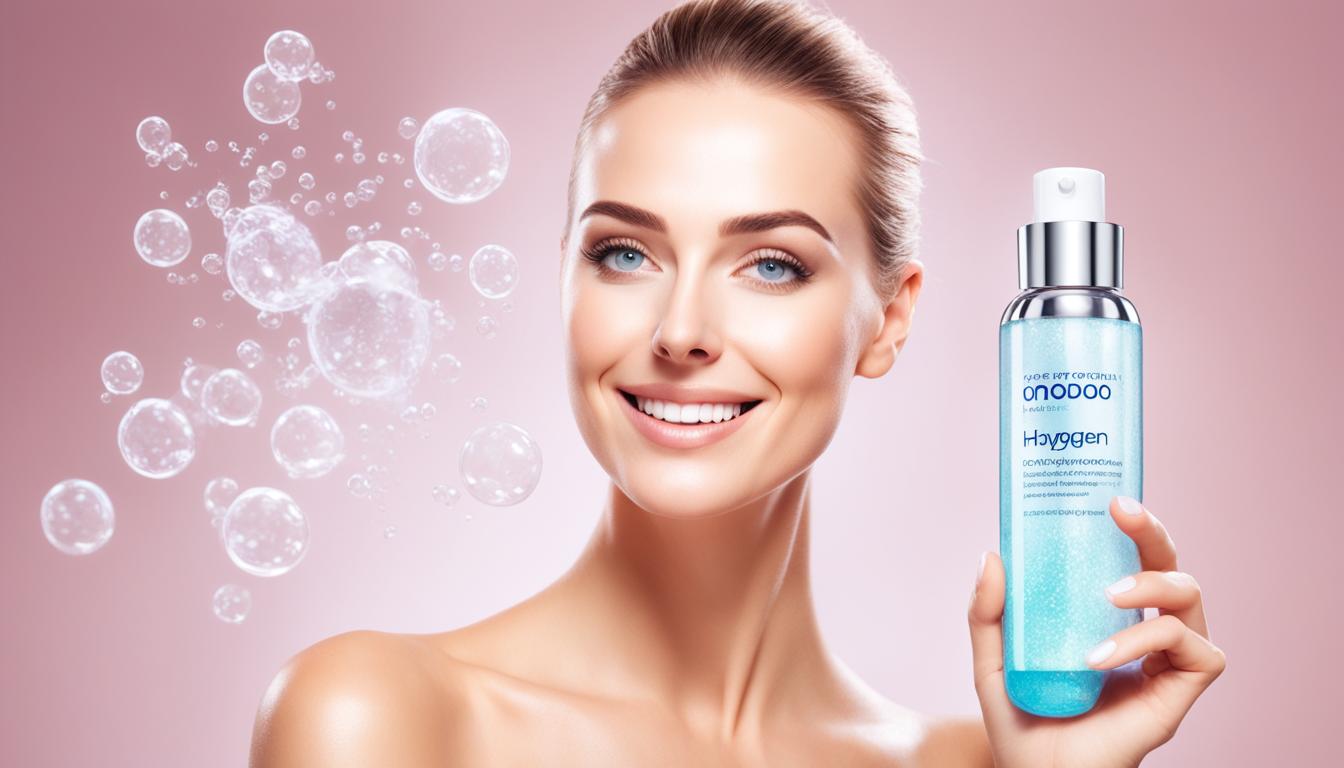Over-the-counter hydrogen peroxide products usually have around 3 percent. But, the industrial versions can go up to 90 percent. This big difference shows why it’s vital to know how useful, yet risky, hydrogen peroxide can be in cosmetics. We’ll look into hydrogen peroxide for cosmetics, its use in hair bleaching, teeth whitening, acne treatment, skin care, and disinfection. Also, we’ll talk about using hydrogen peroxide in cosmetic products, including safety.
Key Takeaways
- Hydrogen peroxide is a versatile chemical compound with various applications in the cosmetics industry.
- Concentrations of hydrogen peroxide can range from 3% in over-the-counter products to as high as 90% in industrial versions.
- Hydrogen peroxide can be used for hair bleaching, teeth whitening, acne treatment, skin care, and disinfection.
- Safety considerations and potential risks, such as skin irritation and toxicity, must be carefully evaluated when using hydrogen peroxide in cosmetic products.
- Understanding the benefits, proper usage, and safety guidelines is crucial when incorporating hydrogen peroxide into one’s cosmetic routine.
Understanding Hydrogen Peroxide
Hydrogen peroxide, or H2O2, is a special liquid. It’s water with an added oxygen atom. This makes it good at cleaning because it releases oxygen when it’s used.
Chemical Composition and Properties
It’s made of two hydrogen atoms and two oxygen atoms. This gives it its power to clean well. Chemical composition and properties allow it to work in cosmetics and for disinfecting.
Concentration Levels and Safety Considerations
There are different strengths of hydrogen peroxide. The 3% one is safe for homes and hospitals. But, stronger types used in industry are toxic. Always use safety measures with strong hydrogen peroxide.
| Hydrogen Peroxide Concentration | Common Applications | Safety Considerations |
|---|---|---|
| 3% Solution | Household, medical use | Relatively safe for limited exposure |
| 6%, 10%, 30+% Solutions | Specialized industrial and commercial use | Highly toxic, require strict safety protocols |
| 12% and Above | Hair bleaching in the cosmetics industry | Potential for skin irritation and damage |
Hydrogen Peroxide for Hair Bleaching
Hydrogen peroxide is a key helper in making hair lighter. It changes the hair by letting out oxygen. This oxygen takes away the melanin in the hair, making it lighter. Although this process is common, it can make the hair dry and brittle if not done right.
Achieving Natural Highlights
Some store-bought hair dyes use hydrogen peroxide to make the color last longer. Mixing baking soda and hydrogen peroxide opens the hair’s outer layer. This lets the hydrogen peroxide reach in and lighten the hair. The result is shiny, light hair that looks like it’s naturally highlighted.
Precautions for Safe Use
Always check the instructions on the product and get advice from a stylist when using hydrogen peroxide. If not handled properly, it can hurt your skin and eyes. It might also damage your hair. The reaction of hydrogen peroxide with your hair can make it thin and fragile. Using a deep conditioner can reduce this risk.
Teeth Whitening with Hydrogen Peroxide
Hydrogen peroxide is well-known in dentistry for hydrogen peroxide teeth whitening. Both professional treatments and at-home methods using it can whiten teeth. By removing stains and discoloration, they leave a brighter smile.
Professional and At-Home Treatments
At the dentist, you might get a 40% hydrogen peroxide treatment. But, products you find in stores have less than 10%. This lower percentage is safe for whitening. Toothpaste with 1% hydrogen peroxide works well too. It whitens teeth but doesn’t harm the enamel. Mixing hydrogen peroxide with water (1:1) at home, you can whiten your teeth. Just be careful.
Potential Side Effects and Risks
But, there are risks with hydrogen peroxide teeth whitening, like tooth sensitivity. You might get gum irritation too. Rarely, it can harm the enamel. Common risks include teeth becoming sensitive and gums getting irritated. Teeth may even become softer.
Before choosing hydrogen peroxide professional teeth whitening or hydrogen peroxide at-home teeth whitening, talk to a dentist. They can make sure it’s safe for you.
Acne Treatment: Hydrogen Peroxide as a Potential Solution
People are looking into hydrogen peroxide acne treatment. It’s because hydrogen peroxide can kill bacteria and dry up pimples by releasing oxygen. But, using it on acne can also make things worse, like causing skin problems and more inflammation.
Understanding the Antibacterial Properties
Hydrogen peroxide has been shown to fight acne. It works by destroying the bacteria that cause pimples. Because of this, many are interested in it as a treatment option.
Alternative Treatments and Precautions
Doctors don’t usually recommend using hydrogen peroxide for acne. They suggest safer options like salicylic acid or benzoyl peroxide. Hydrogen peroxide acne precautions include possible skin irritation, dryness, and making acne worse.
It seems the risks of using hydrogen peroxide for acne might be greater than its benefits. Always talk to a skin specialist before trying any hydrogen peroxide acne treatment. Look for treatments that are safe and made for skin that’s prone to acne.
hydrogen per oxide for cosmetics
Hydrogen peroxide acts as a skin disinfectant but, it’s not great for making hydrogen peroxide cosmetics. It can irritate your skin, leading to problems like blisters and burns. Although some people try hydrogen peroxide skin care products for dark spots and acne, the risks are too high.
Skin Care Applications
Experts don’t recommend using hydrogen peroxide for cosmetic skin care. They suggest safer choices like alpha-hydroxy acids or vitamin C. Even though hydrogen peroxide topical use has some uses, it’s important to talk to a skin doctor first for hydrogen peroxide skin safety.
Safety Guidelines for Topical Use
Thinking about using hydrogen peroxide on your skin? Remember to follow safety tips and see a dermatologist first. Concentrated hydrogen peroxide can hurt your skin and cause swelling. So, be careful and get advice before adding hydrogen peroxide cosmetics to your beauty routine.
Hydrogen Peroxide as a Disinfectant
Hydrogen peroxide is known for disinfecting. It’s used at home and in medical places. This is because it kills germs and cleans deeply.
Household and Medical Applications
At home, it helps clean many things like counters and bathrooms. In medicine, it cleans equipment and treats cuts. It also helps make your mouth cleaner.
The kind you find at stores has 3% peroxide. It works well against germs. This makes it good for lots of things, from baths to toys.
A mix of half hydrogen peroxide and half water works fast to kill germs. It’s better than using just water or even bleach. This mix is great for washing fruits and veggies too.
Hydrogen peroxide can also take out tough stains. It helps with dirty carpets, clothes, and more. Plus, you might find it in tooth whiteners and beauty products.
For nails, soaking them in a hydrogen peroxide mix can remove polish stains. It’s also good for cleaning your toothbrush. Just be sure to rinse well after soaking.
Keep hydrogen peroxide in a safe place away from kids and pets. It should stay in a dark spot to stay strong.
Potential Risks and Side Effects
Hydrogen peroxide is handy, but it carries risks. When used on skin, it can irritate and sometimes burn. This happens more with stronger versions. Some people also might get hives or feel itchy from it.
Skin Irritation and Allergic Reactions
Using hydrogen peroxide might make your skin turn red or sting. Most folks are fine, but some could have a bad reaction. If you start having trouble breathing, you need help right away. Tell the authorities about any weird side effects.
Ingestion and Inhalation Hazards
Drinking or breathing in hydrogen peroxide is very risky. It can cause you to vomit or have worse problems. There’s a big gap in safety between the 3 percent found in stores and the 90 percent used in some industries. The strong stuff is very dangerous and can harm you in many ways.
Always be careful when using hydrogen peroxide. If it touches your skin, wash it off with lots of water. The eyes need flushing for up to 20 minutes if they come into contact. For skin care, consider safer options. Things like vitamin C or advice from a skin doctor.
Alternatives to Hydrogen Peroxide
Using hydrogen peroxide can come with risks and side effects. So, it’s smart to look for safer, better choices for skin care and cleaning. Many alternatives for skin care have been found better and less harsh than hydrogen peroxide.
Safer Options for Skin Care and Disinfection
Salicylic acid and benzoyl peroxide are great for fighting acne without the harshness. For better skin color and texture, alpha-hydroxy acids are effective. They include glycolic and lactic acids. These are safer than using hydrogen peroxide on the skin.
For cleaning, quaternary ammonium compounds, vinegar, and essential oils are good. They work well against germs. These options are also better for the environment and less risky for people’s health.
Natural and Gentle Alternatives
There are also natural alternatives that are gentle. For instance, aloe vera, tea tree oil, and witch hazel can be used. They have properties that fight germs and soothe, without irritating like hydrogen peroxide can.
Always start with checking with a healthcare expert or doing your homework. This ensures what you pick is safe and works. By trying out gentle options, you can take care of your skin and clean safely without relying on hydrogen peroxide.
Conclusion
Hydrogen peroxide is widely used in cosmetics for tasks like bleaching hair and whitening teeth. It is also used to treat acne and disinfect. But, its use in products needs careful thought because it can have risks.
People should know the risks of using hydrogen peroxide too much or in high amounts. They should try safer options advised by healthcare workers. Understanding hydrogen peroxide’s risks will help people use it wisely in their beauty and personal care routines.
While hydrogen peroxide is useful, people must know how to use it safely. They should also consider other safer choices. This way, they can enjoy its benefits without harm.
FAQ
What is hydrogen peroxide and what are its properties?
What are the common concentration levels of hydrogen peroxide and their safety considerations?
How is hydrogen peroxide used for hair bleaching and what are the precautions?
What are the benefits and risks of using hydrogen peroxide for teeth whitening?
Can hydrogen peroxide be used as an acne treatment, and what are the alternatives?
Is hydrogen peroxide recommended for cosmetic skin care, and what are the risks?
What are the household and medical applications of hydrogen peroxide as a disinfectant?
What are the potential risks and side effects associated with the use of hydrogen peroxide?
What are some safer and more effective alternatives to hydrogen peroxide for cosmetic and disinfectant applications?
Source Links
- https://www.healthline.com/health/hydrogen-peroxide-skin
- https://www.webmd.com/drugs/2/drug-76035/hydrogen-peroxide/details
- https://www.laballey.com/pages/hydrogen-peroxide-in-the-cosmetics-industry
- https://www.products.pcc.eu/en/blog/hydrogen-peroxide-a-substance-with-many-applications/
- https://www.healthline.com/health/hydrogen-peroxide-hair
- https://www.makkicosmetics.com/makki/showProduct.jsp?productID=HairPeroxide20V90&brandID=ArtX
- https://www.healthline.com/health/hydrogen-peroxide-teeth-whitening
- https://www.medicalnewstoday.com/articles/326148
- https://www.health.com/condition/oral-health/is-it-safe-to-use-hydrogen-peroxide-to-whiten-teeth
- https://www.healthline.com/health/hydrogen-peroxide-for-acne
- https://www.ncbi.nlm.nih.gov/pmc/articles/PMC7912839/
- https://incibeauty.com/en/ingredients/16749-hydrogen-peroxide
- https://www.univarsolutions.com/hydrogen-peroxide-35-cosmetic-827073
- https://health.clevelandclinic.org/what-is-hydrogen-peroxide-good-for
- https://wwwn.cdc.gov/TSP/MMG/MMGDetails.aspx?mmgid=304&toxid=55
- https://www.verywellhealth.com/hydrogen-peroxide-for-skin-5104959
- https://health.ec.europa.eu/other-pages/health-sc-basic-page/clarification-opinion-concerning-hydrogen-carbamide-peroxide-tooth-whitening-products-adopted_en
- https://ijdvl.com/hydrogen-peroxide-in-dermatology/



